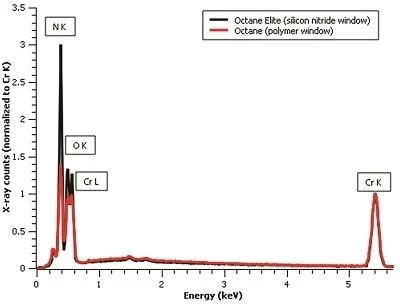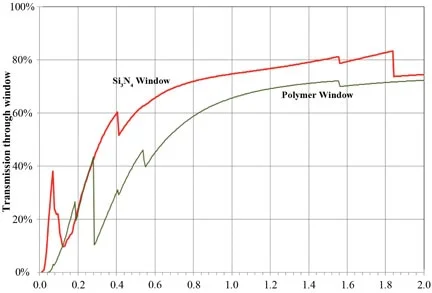The EDAX Octane Elite EDS system, equipped with Octane Elite silicon drift detectors (SDDs), represents a significant leap in energy dispersive X-ray spectroscopy (EDS/EDX) analysis.
This EDAX system features detectors with a silicon nitride (Si3N4) window, resulting in remarkable enhancements in low-energy sensitivity for microanalysis at low kV and the detection of light elements.
Furthermore, the Octane Elite detectors utilize technology that enables high-speed X-ray data processing within a compact, fully vacuum-encapsulated detector device.
Octane Elite silicon drift detectors
The Octane Elite SDDs are built with a silicon nitride (Si3N4) window, a motorized slide, and high-speed electronics. They can seamlessly integrate with EDAX's electron backscatter diffraction (EBSD) cameras and/or wavelength dispersive spectroscopy (WDS) detectors, forming either the Trident (EDS-EBSD-WDS) system or the Pegasus (EDS-EBSD) system. These combinations provide comprehensive solutions for materials characterization.
There are two models of the Octane Elite SDDs:
- Octane Elite Plus - 30 mm2 chip
- Octane Elite Super - 70 mm2 chip
Best light element performance
In comparison to a polymer window, the silicon nitride window offers significant improvements, resulting in greatly enhanced performance when it comes to detecting light elements and delivering considerably more essential data for the analyst.
Si3N4 window
The silicon nitride window offers excellent low-energy transmission, surpassing the performance of a polymer window.

Spectra acquired from a chromium nitride sample at 10 kV. The comparison of the scaled spectra to the Cr K peak clearly shows the increased nitrogen and oxygen peak intensities achieved with a Si3N4 window. Image Credit: Gatan
Benefits
The major benefits of the Octane Elite SDDs are:
Low kV performance
- The mechanical properties of Si3N4 permit the use of thinly fabricated windows, offering significant advantages in terms of optimal low-voltage analysis and sensitivity.
Optimized SDD electronics
- Swift pulse processing for mapping and quantification tasks.
- High-resolution quantitative analysis at mapping speeds exceeding 400,000 output cps.
- Optimized data quality across all count rates.
Throughput
- EDAX EDS systems, equipped with state-of-the-art detection electronics, offer the highest throughput count rates available on the market, resulting in superior analysis and increased productivity.
Reliability
- The robustness and material properties of Si3N4 guarantee the availability of the most durable and dependable detectors suitable for a wide range of EDS applications.
Motorized slide
The motorized slide on the Octane Elite SDDs allows for precise control of the detector through software, enhancing analytical flexibility. This feature is well-suited for use with all focused ion beam (FIB) systems.

Image Credit: Gatan
EDS analysis software allows users to optimize their analysis time and get the best possible data from their sample
- Smart Pulse Pile-Up Correction mitigates issues associated with high count rate collections and enables the fullest utilization of SDD technology.
- Smart Diagnostics and Smart Acquisition facilitate the optimization of collection and analysis conditions.
